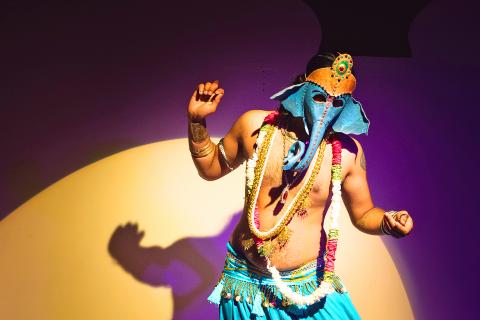Terrence McNally’s A Perfect Ganesh proves to be the most ambitious and challenging play that LAB Space has undertaken this year.
Director Brook Hall admits to seeking the challenge, showing how LAB Space’s black box theater can do a play involving multiple scene and costume changes as well as including the intriguing exoticism of India.
A different challenge comes from McNally himself who pairs two stereotypical middle-aged Connecticut women. They are friends, but each has her secrets. Together they have foregone another “boring” vacation in the Caribbean to take on a personal and spiritual “passage to India.”

Photo courtesy of Fabian Hamacher
McNally frames the play as a situation comedy, but he also has other thematic goals in mind such as gay acceptance, AIDS, personal loss and redemption.
The play’s successful denouement depends on a better understanding of the origin and role of omni-present Ganesh, the god of wisdom in the Hindu pantheon.
Stephen Rong, who plays the character Man, comes through in a role that requires much diversity as he plays many separate supporting parts.
The two women face separate secret demons as they bond. Margaret (Sue Desimone) must overcome a buried past, hidden behind a brassy front. (“I’ve had my day.”) Katherine (Sharon Landon) grieves at not being able to tell her “imperfect gay” son that she loved him before he passed away. (“All I have left is my anger.”) The women work well including a number of humorous moments as they attempt to handle the diversity of India.
The script, however, is lengthy and creates too much of an ambivalent challenge by further playing this against each woman’s separate redemptive pathos. EM Forster found it best not to mix sit-com with seriousness. This might be why McNally didn’t receive the Pulitzer for the work, though it nominated.
The Taiwan-born Manav Mehta, completes the cast. He wears the challenging Ganesh mask and conveys the compassionate acceptance of life’s diversity.
All in all, Hall continues to build a solid group of actors in Taiwan. The opening night had a few kinks with sound and props, but that did not alter the solid performances.
Jen-Jacques Chen, whose brief puppet animation cleverly explained Ganesh’s origin, deserves mention.
A Perfect Ganesh, partially sponsored by Taipei’s Department of Cultural Affairs, is worth seeing and LAB space is worth supporting.
The play continues tomorrow through Sunday with all shows beginning at 8pm. Tickets are NT$600 and can be bought through www.accupass.com/go/ganesh
For more information on the theater troupe and directions to get there, go to: www.thelabtw.com.

That US assistance was a model for Taiwan’s spectacular development success was early recognized by policymakers and analysts. In a report to the US Congress for the fiscal year 1962, former President John F. Kennedy noted Taiwan’s “rapid economic growth,” was “producing a substantial net gain in living.” Kennedy had a stake in Taiwan’s achievements and the US’ official development assistance (ODA) in general: In September 1961, his entreaty to make the 1960s a “decade of development,” and an accompanying proposal for dedicated legislation to this end, had been formalized by congressional passage of the Foreign Assistance Act. Two

March 31 to April 6 On May 13, 1950, National Taiwan University Hospital otolaryngologist Su You-peng (蘇友鵬) was summoned to the director’s office. He thought someone had complained about him practicing the violin at night, but when he entered the room, he knew something was terribly wrong. He saw several burly men who appeared to be government secret agents, and three other resident doctors: internist Hsu Chiang (許強), dermatologist Hu Pao-chen (胡寶珍) and ophthalmologist Hu Hsin-lin (胡鑫麟). They were handcuffed, herded onto two jeeps and taken to the Secrecy Bureau (保密局) for questioning. Su was still in his doctor’s robes at

Last week the Democratic Progressive Party (DPP) said that the budget cuts voted for by the China-aligned parties in the legislature, are intended to force the DPP to hike electricity rates. The public would then blame it for the rate hike. It’s fairly clear that the first part of that is correct. Slashing the budget of state-run Taiwan Power Co (Taipower, 台電) is a move intended to cause discontent with the DPP when electricity rates go up. Taipower’s debt, NT$422.9 billion (US$12.78 billion), is one of the numerous permanent crises created by the nation’s construction-industrial state and the developmentalist mentality it

Experts say that the devastating earthquake in Myanmar on Friday was likely the strongest to hit the country in decades, with disaster modeling suggesting thousands could be dead. Automatic assessments from the US Geological Survey (USGS) said the shallow 7.7-magnitude quake northwest of the central Myanmar city of Sagaing triggered a red alert for shaking-related fatalities and economic losses. “High casualties and extensive damage are probable and the disaster is likely widespread,” it said, locating the epicentre near the central Myanmar city of Mandalay, home to more than a million people. Myanmar’s ruling junta said on Saturday morning that the number killed had